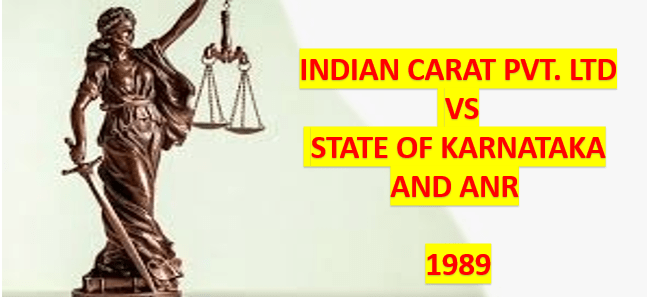
| Case name | India carat Pvt. LTD vs state of Karnataka and anr 1989 |
| Equivalent citation | 1989 AIR 885,1989 SCR (1) 718 |
| Date of judgement | 15/02/1989 |
| Court | Supreme court of India |
| Case no | No.105 of 1989 |
| Case type | Criminal appeal |
| Petitioner | India carat Pvt. LTD |
| Respondent | State of Karnataka and anr |
| Bench | Natarajan, s.(J), Pathak, r.s. (CJ),Venkatachalliah, m.n. (J) |
| Referred | Criminal procedure code 1973Jurisdiction of magistrateIndian penal code |
FACT OF THE CASE
- In this case the investigation started from the report given to the police by the appellant against the second respondent.
- The second respondent was an employee of the appellant working as divisional manager.
- The second respondent negotiated with an Italian firm on behalf of the appellant for supply of quality granite stones and had obtained a letter of credit and availing the credit of the facility.
- So, the appellant gave a report to the commissioner of police that the second respondent committed the offence of cheating and criminal breach of trust.
- After registration the investigation was started, and the police sent a ‘B’ report stating that further investigation is not required as the case was of a civil nature.
- The appellant approached the second additional chief metropolitan magistrate for quashing the report and for the permission to prove the commission of offences by the second respondent after that the magistrate passed the order against the second respondent under section 408 and 420 I.P.C and for Issuing summons to him.
- The second respondent approached the high court and filed a petition for quashing the order of the magistrate. The high court allowed the petition on the grounds the magistrate had not followed the procedure. The magistrate should have issued a notice to the appellant after sending ‘B’ report by the police to find out whether he was disputing the correctness of the ‘B’ report and if so, to comply with requirements of section 200,719 of the code. Before registering the case or process issuing the accused the magistrate should examine the appellant on oath and his witness.
- The appellant preferred this appeal by special leave against the order of the high court.
- The appeal was allowed
ISSUE RAISED
- Whether the high court order is right or wrong.
CONTENTIONS OF THE PETITIONERS
- Argument on behalf of appellant was contented that the second respondent had no legal right to question the order of magistrate and the magistrate was justified in taking cognizance of the offence and directing the issue of process to the second respondent.
CONTENTIONS OF THE RESPONDENTS
- The respondent argued that the magistrate had not followed the procedure laid down in section 200 or section 202.
- The second respondent was entitled to seek the quashing order of the magistrate.
- The high court was right in setting aside the order of the magistrate.
REASONS OF JUDGEMENT
- The magistrate has several courses open to him on the receipt of a complaint.
- Under section 200 a magistrate may take cognizance of the offence at once and proceed to record the statement of the complaint and a witness after recording the statement if in the opinion of the magistrate there is no sufficient ground for proceeding, he may dismiss the complaint under section 203.
- The magistrate can ignore the conclusion by the investigation officer and independently apply his mind to the facts emerging in the report, if he thinks fit, in exercise of his powers under section 190(1)(b) and direct the issue of process to the accused.
- The magistrate is not bound in such a situation to follow the procedures laid down under section 200 and 202.
- Therefore, in this case the high court was wrong in taking the view that the second additional chief metropolitan magistrate was not entitled to direct the registration of the case against the second respondent and the issue of summons to him.
- In this case the investigation did not originate from a complaint preferred to the magistrate.
JUDGEMENT
In this case the court set aside the high court order and restored the order of the magistrate and the court directed that the case against the second respondent should proceed in accordance with law.
CONCLUSION
This is a case of cheating and criminal breach of trust which is based on the report given to the police by the appellant. After investigation subsequently the police sent a ‘B’ report to the court stating that no further investigation is required. The appellant approached the court to quash the order and permission to prove commission of the offences. The court passed an order favour to the appellant, so the second respondent approached high court against the order and the high court passed an order favour to the second respondent on the ground that the magistrate not followed a procedure under section 200 and 202.the supreme court state that there is several course open to a magistrate on the receipt of the complaint and passed an order favour to the appellant.
REFERENCE
https://indiankanoon.org/doc/1440864/
written by sneha c intern under legal vidhiya




0 Comments